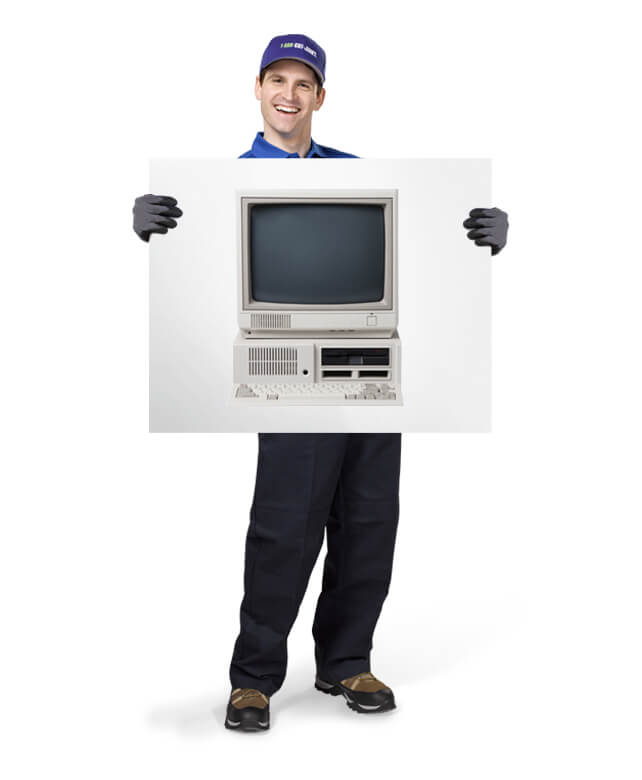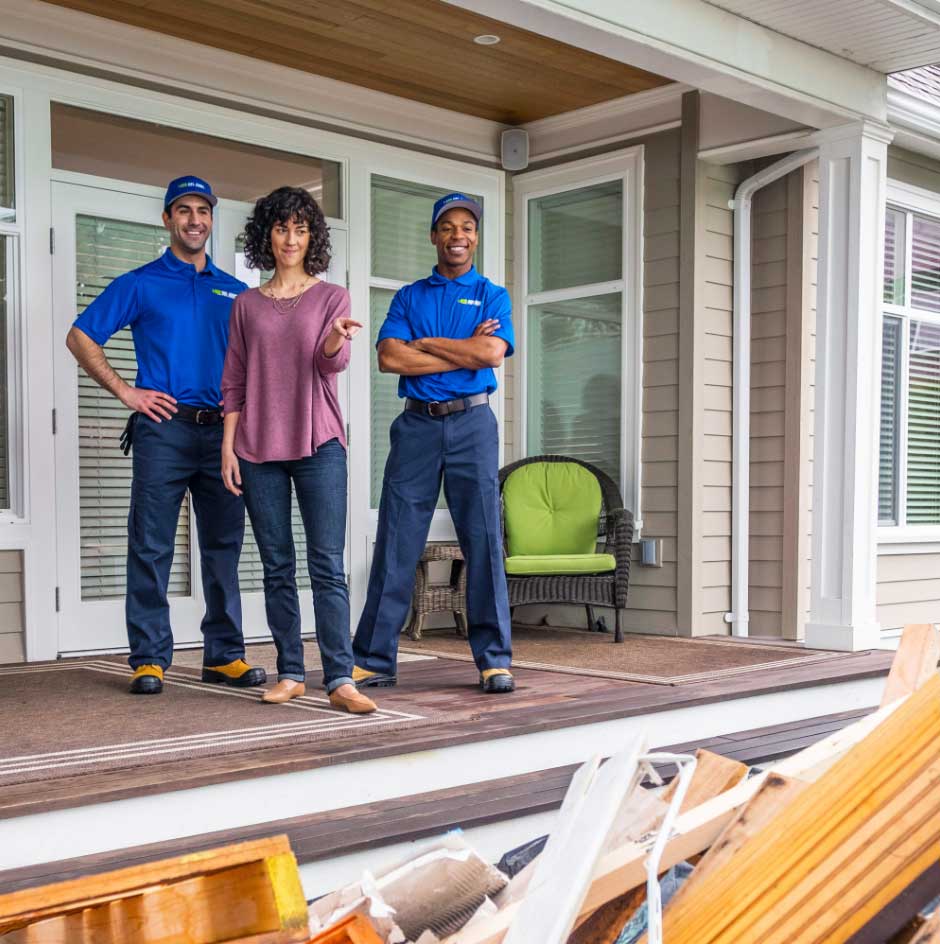Electronic waste disposal service near you
Inevitably, we all end up with broken electronics that we need to get rid of. However, getting rid of old technology, commonly known as “e-waste” is not as simple as throwing it in the garbage.
Most technology - including cell phones, CD players, televisions, and fax machines - contain hazardous materials that could cause damage to the environment if proper electronic waste disposal is ignored. When e-waste recycling is not available, these items should be donated whenever possible.
We offer electronic recycling and pickup for all types of devices
- CD Players
- Cell Phone
- Computers
- Computer Monitors
- DVD Players
- Fax Machines
- Monitors
- Printers
- Stereos
- Televisions
- VCRs
- Mobile Devices & Cellphones
Electronics recycling pick up services
1-800-GOT-JUNK? is experienced in providing e-waste recycling and pickup services. We’re happy to help get those old items out of your way – all you have to do is point!
Our friendly team of professionals is trained to handle your e-waste disposal properly. We recycle, refurbish, and donate whenever possible to make sure we keep as much electronic waste out of landfills as possible.
If you need e-waste pickup, give us a call and we’ll take care of everything for you. All you have to do is point!
Electronics and e-waste FAQs
Electronic waste, or "e-waste," is a term used to describe discarded or broken electronic devices. This waste includes broken computers, televisions, stereos, VCRs, music players, DVD players, monitors, and cell phones. Many of these products may be salvaged, refurbished, reused, or recycled.
Getting rid of your old cell phones, computers, and televisions largely depends on the condition that they’re in.
Here are some responsible ways to handle your electronic disposal:
- Locate an electronics recycling facility in your town.
- Donate working electronics to local charities or nonprofits.
- Donate or sell your e-waste for parts.
- Check to see if your local retailers offer trade-in services or buy used goods.
- Find out if any local retailers offer e-waste recycling.
- Sell your old electronics online.
- Attend a hard-to-recycle or e-waste recycling event.
- Find out if your trash collection service accepts electronics.
Electronic devices should only be thrown in a landfill as a last resort.
Before e-waste is recycled, it is first inspected to determine if it can be refurbished or donated. Once it is ready to be recycled, the device is taken apart and the materials are organized into separate categories to determine what can be reused and what can be further processed.
Determining which parts can be reused or converted is important because many electronics contain toxic metals and chemicals that need to be disposed of in a careful manner. When an electronic device is dismantled, the toxic pieces are properly disposed of while the reusable pieces are used for other purposes.
Due to the presence of toxic materials and chemicals found in most electronic devices, many waste management companies do not accept old electronics in regular trash pickup or curbside recycling services. These same toxic materials also make it illegal to throw old electronics into the trash in many cities. To avoid being fined or damaging the environment, e-waste must be disposed of properly.
All e-waste thrown in the trash will end up in landfills. However, leaving old electronics in a landfill can have a harmful effect on the environment. Whenever possible, the most responsible way to handle e-waste is to recycle or refurbish it. Recycled electronics are processed at facilities and reused to make new products. Broken electronics that can be fixed or reused still have value and can be donated or sold.
When e-waste isn’t recycled, it ends up in the landfill where it is exposed to the elements. Over time these electronics – made from toxic materials such as lead, mercury, zinc, flame retardants, and chromium – can release toxins into the air and the soil, affecting the atmosphere and tainting groundwater supplies.
Taking the time to properly dispose of electronic waste can prevent these substances from making their way into soil, causing damage to plants and animals, and potentially harming our food and water supply.
When you use 1-800-GOT-JUNK? to get rid of your electronic waste, you don’t have to worry about where to take your electronics. We work with local charities and recycling facilities to ensure all the components are properly disposed of.
With the rate of cell phone ownership increasing every day, replacing your old phone with the latest model has become a standard for many phone owners.
Like many electronic devices, cell phones contain materials that can cause harm to the environment if left in a landfill. These chemicals can be released from the phone and contaminate the atmosphere and surrounding soil.
Here are some ways you can dispose of or reuse your old cell phone:
- Trade your old phone in when buying a new one.
- Sell your working phone online, to a friend, or to a family member.
- Keep your old phone as a backup or experimental phone.
- Donate your old phone to a charity or nonprofit organization.
- Take your old phone to an electronics recycling facility.
- Ask your phone retailer if they offer phone recycling.
- Check to see if your waste management service accepts electronics.
How to safely dispose of old batteries all depends on the type of battery you have. Alkaline batteries, which are the most common household battery types, are safe to throw away with your regular trash. However, car batteries and lithium batteries – which are often used in phones and computers – are not safe to be left in landfills.
Here are some ways you can get rid of old batteries:
- Take your batteries to a local electronics recycling facility.
- Stop by a local electronics retailer and leave them in designated bins.
- Throw away all AAA, AA, 9V, and D-cell batteries in your trash can.



